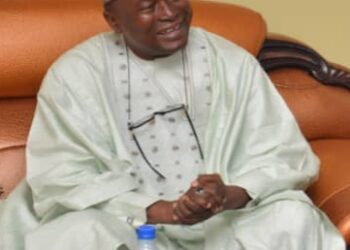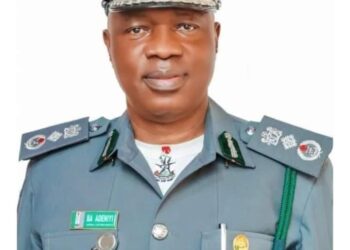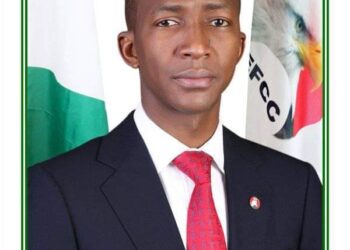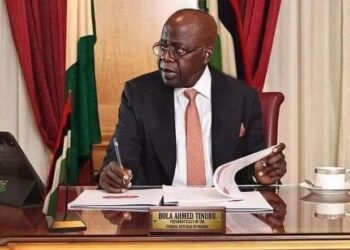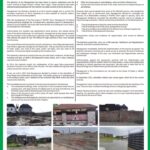There is no gainsaying that the present administration of Bola Ahmed Tinubu is poised to push for, expand, and sustain the frontier of Security Sector Governance (SSG), with the new security Sheriff in the Office of the National Security Adviser; Nuhu Ribadu, in their-so-far-applauded-strides of returning Nigeria back into a workable Nation away from the banana republic status. The appointment of Mr Ribadu further projects the need to jettison the State security approach for Human Security trajectories in our State concentric National Security disposition. National Security is not all about guns and ammunitions for State territorial control, rather it is about a condition free of fair, dignified living, free of apprehension and absence of lacks.
The New National Security Adviser, Mr Ribadu should therefore be seen promoting all the constructs of human security as found in food security, health security, economic security as against the building of arms and ammunition which do not bring peace, security nor political stability. Thus, a country that invests heavily in human security may not have to spend much money and efforts in fighting crimes like secessionism, kidnapping, banditry, human trafficking, student unrest, political assassination, regional agitations and terrorism as seen coalescing in the contraption called Nigeria. Achieving such human security trajectories, could be found in activating Security Sector Governance, of which the appointment of Mr Nuhu Ribadu signposts.
In its simplest form for understanding, Security Sector governance places the Military, Intelligence and Law Enforcement (MILE) under the control of civilian in a democratic settings. It simply promotes the evolvement of strong institutions that demands for the accountability of all security apparatus to civil rule. The security of Nigerians does not resides alone in State and territorial security as projected by the Cold War era mentality rather it is properly situated in pushing for human security. The formal as against the latter has been the preoccupation of the Nigeria military and the political elites, who excessively gained from the skewed definition of security as against the broadening human security approach. Such constricted approach could be seen in the National Security Strategies documents wholly done by the Military, Intelligence and Law Enforcement (MILE), excluding inputs of others.
The National Security Strategies (NSS) of 2015 and 2019 from the Office of the National Security Adviser (ONSA) is largely bereft of inputs from all other government ministries, departments, Agencies nor the academia, who are to be seen deepening the definition security for defenceless Nigerians. From food security to health security onto education security, not excluding political security nor environmental security while community security and economic security should be upheld all together and extensively as against securitization of banditry, kidnapping, maritime piracy, terrorism, insurgency, secessionism. The need to redefine Nigeria’s definition of security outside the definition foisted by the Military, Intelligence and Law Enforcement is long overdue. When security is defined along the constructs of ensuring and provisioning of economic security, food security, health security, education security, political security, environmental security and community security amongst others. It is by then, we will be catering for the needs of every Nigerians as against the need of the elites in the military and in government. This is one of the onerous tasks ahead of Nuhu Ribadu, hence the need for such appointment to stick.
Another nuances of disconnect, from the office of the National Security Adviser, are the preponderances of militarisation mechanisms of our internal security which has not in any way slow down insecurity rather it keeps flaring up the salvo of violent crimes driven by skewed ideology and justifications to bear arms. Issues that could in the interest of all, be addressed through dialogues and good governance are militarised out of proportion and resources that would have addressed the situation via job provision, food provisions, and public services provisioning are channeled into different military Operations across the Nigeria federations. The need to revisit the drawing board cannot be over emphasised in the interest of all. It is crystal clear that violence is no longer the monopolistic heritage of the government, as years of militarisation of the entity called Nigeria, has taken us as a nation into security and safety but rather the whole landscape is overwhelm with violent crimes.
The Office of the National Security Adviser, should be seen escalating accountability of all Military, Intelligence and Law Enforcement to democratic structures. Days of administrative, financial and operational recklessness is over. Accountability is at the core of security sector reform and should be a beacon for standard, henceforth. This is what is obtainable in developed clime and aspiring towards that should be the least the populace deserves. Days of security votes as non-auditable should be receding away for good governance emergence. The Nigeria military should not be seen reforming itself by herself but such reformation should align with what is obtainable in other climes that have embraced security sector reform for the betterment of a great nation.
Paradoxically, it was Lt. Gen Dambazzau that suggested unification of basic trainings for all paramilitary services in Nigeria. Such lofty ideas should be extended to all Military, Intelligence and Law Enforcements as such paradigm shift will drastically remove unnecessary interagency rivalry and unfruitful competition. There is no gainsaying that a three month basic training for all Nigerians aspiring to enlist in Army, Navy, Airforce, NDLEA, Nigeria Police, NSCDC, DSS, FRSC, Immigration, Correctional Services etc will unify the recruitees to the extent that participants could judge themselves ahead, of who could be seen drafted into FRSC, Navy, NSCDC or Police Services ahead of their deployment into these specialised agencies. Performance during such basic trainings will apparently reveal who goes to which agency as earlier displayed on training. This will greatly reduce the entitlement spirit that once participants’ parents are in any of the services, employment into such services becomes automatic. Merit could be seen sacrificed in our recruitment into services and the country remain the worst of it. Hence, the need for President Bola
Ahmed Tinubu and the incoming National Security Adviser to overhaul existing skewed approach to recruitment is overdue.
Concerningly, the new National Security Sheriff in Mr Ribadu and his Critical Thinking Team should extensively interrogate the Insurgency Economy as seen playing out in Nigeria particularly in the North East. The writer in a bid to share a common ground with an erudite psychologist and a security expert; Prof Zamani Andrew, who sees Small Arms and Light Weapons (SALW) proliferation as indicator of governance failure. Same governance failure accounts for inability to set up a functional agency tracking, tracing and arresting proliferation of arms, rather a presidential taskforce warehoused in the ONSA oversees such an overarching duty. Same governance failure affords the insurgency economy to thrive in the North East thus keeping the terror war in an unending cyclical form. The agitations of private individual to acquire arms and ammunition for self-protection, the drive for regional agitators taking to arms, the failure to overhaul the aged and expired 1959 Firearms Ordinance and align with both international and regional protocol on arms proliferations, the evidently loose armoury management that affords military and law enforcement armouries to be overtaken, with seizure of government assets seen in the possession of terror cells and bandits, are all the unsettling effects of governance failure and all these must be engaged by Mr. Nuhu Ribadu.
The need for the Ribadu Security Model to overhaul the Nigeria Security Architecture cannot be overstated. The concentric, over-aged and unitary security architecture can no longer sustain the containment of crime and criminalities in a complex Federation like Nigeria. The need to take security closer to the people lies in tinkering and overhauling the present composition of the Nigeria National Security Council (NSC). Borrowing a leaf from Ghana, South Africa, Singapore and other developed clime, National Security Council of these aforementioned Nations are no longer dominated by Army, Navy, Airforce and Police. The Customs, Immigration, Civil Defence and Correctional Services are fully represented to project human security as against the expired approach of guns and ammunition called State Security which has not help in stemming the tides of crime in Nigeria. The issue of border control is a very sensitive security issues in the United States but not attended to nor seen on the Nigeria Security Architecture. Funnily also, Nigeria is the only country in the world, where the lead agency for the protection of her Critical National Assets and Infrastructure is nowhere to be seen on her National Security Council but rather tucked away inside the Intelligence Community Committee (ICC).
Interestingly, Nigeria is one of the few countries whose Naval Assets through the Nigeria Navy also supervises and oversees her maritime space as against the evolvement of a Coast Guard. This arrangement foisted by the military in a bid to dominate national security issues has extensively soiled the hands of the military particularly the Nigeria Navy as revealed by Asari Dokunbo which also validates exposures made by Tompolo Government, whereby illegal pipelines constructed and embedded on the high sea syphoning the nations crude oil under the watch of the Navy is enough to relieve all top echelons of the military from office. The need to evolve a coast Guard and empower Nigeria Maritime Space Agency (NIMASA) cannot be overemphasised. The need to allow and enable Marine Guards for Nigeria Police, Nigeria Security and Civil Defence Corps and National Drug Law Enforcement Agency (NDLEA) to secure our maritime space should also be an issue that should occupy the Critical Thinking Team of the National Security Adviser to Mr President.
Permit me to summarise the way forward in the tone of Prof. Adoyi Onoja that, now is the right time to retire “Security” away from the image of the Military and begin the construction of security in the image of civil rule. It is time to revamp and reconfigured what are security issues and what are not to be securitized. Security should not be seen as a cesspool of corruption with Nigeria rated as the third most corrupt Nation in Military assets procurement. According to the 2022 Corruption Perceptions Index reported by Transparency International, Nigeria is the 150 least corrupt nation out of 180 countries. Prosecuting a counterinsurgency war with assets of less value are issues to attract the attention of President Bola Ahmed Tinubu and Mr Nuhu Ribadu in their giant strides to retire “Security” away from the image of the Military and begin the construction of security in the image of civil rule.
Dr. ONIBIYO Rotimi writes from Nasarawa State University Keffi





